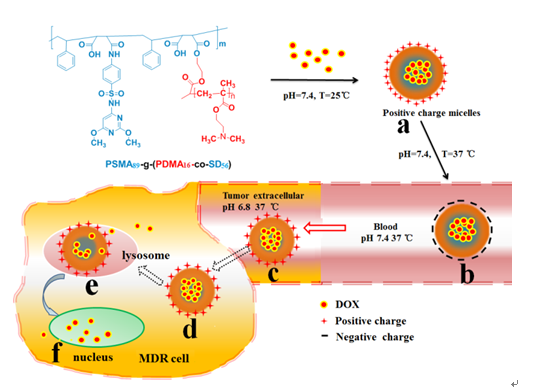课题组关于热和pH双重可控电荷反转的接枝共聚物胶束在克服癌细胞抗药性方面的研究发表在J. Mater. Chem. B上
Thermo and pH Dual-Controlled Charge Reversal Amphiphilic Graft Copolymer Micelles for Overcoming Drug Resistance in Cancer Cells
Haitao Zhang,a Xiao-dong Fan,a, * Fei Li,b Rongtian Suo,a Hui
Li, a Zhen Yang,a Wanbin Zhang,a Yang Bai,c Wei Tian,a,*
Currently, multidrug resistance
(MDR) is the major challenge of nanotechnology in cancer treatment. In
this study, a series of amphiphilic poly(styrene-co-maleic anhydride)-graft-poly(2-(N,N-dimethylamino)ethyl methacrylate) graft
copolymer [PSMA89-g-P(DMA16-co-SD)] micelles, was
prepared. PSMA89-g-P(DMA16-co-SD) graft copolymers were
first synthesized by grafting different
amounts of sulfadimethoxine (SD) onto
PSMA89-g-P(DMA16-co-SD). The PSMA89-g-P(DMA16-co-SD56)
micelles exhibited a thermo and pH dual-controlled charge reversal property
without cleavage of chemical bonds. The surface charge of PSMA89-g-P(DMA16-co-SD56)
micelles reversed from positive to negative after the solution temperature
increased from 25 °C to 37 °C at pH 7.4. However, when the pH value was
adjusted to 6.8 at 37 °C, the surface charge became positive again. The thermo
and pH dual-controlled charge reversal not only resulted in a controlled doxorubicin
(DOX) release but also effectively enhanced the cellular uptake of DOX-loaded
PSMA89-g-P(DMA16-co-SD56) micelles through
electrostatic absorptive endocytosis. MTT assay demonstrated that DOX-loaded
PSMA89-g-P(DMA16-co-SD56) micelles showed the highest
inhibition growth of DOX-resistant ovarian carcinoma (A2780/DoxR)
cells with pH 6.8 at 37 °C among those with pH 7.4 at 37 °C and pH 7.4 at 25
°C, leading to higher efficiency in overcoming MDR of A2780/DoxR cells. Therefore, PSMA89-g-P(DMA16-co-SD56) micelles can be used
as intelligent drug-delivery systems to overcome MDR of cancercells.

全文链接:http://pubs.rsc.org/en/Content/ArticleLanding/2015/TB/C5TB00530B#!divAbstract